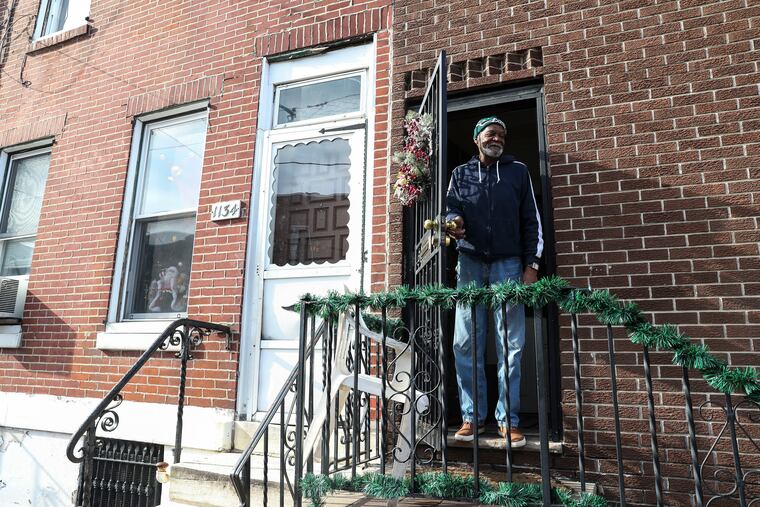Democratic groups are going door-to-door while their 2020 candidates are distracted by the primary
For Our Future is one of several already organizing Democratic field operations to knock on doors in swing states almost a year before the 2020 general election.

The looming impeachment of President Donald Trump and a crowded Democratic primary are dominating the news. But when Craig Robbins goes door-to-door asking voters what they care about, almost no one mentions politics.
“It’s health care, crime, schools, kitchen-table issues,” Robbins said. He was out canvassing for the group For Our Future, a progressive political action committee cofounded by, but now unaffiliated with, Tom Steyer, a billionaire and Democratic candidate for president.
The group, which plans to spend $80 million across seven key states in 2020, is hoping to engage potential Democratic voters, particularly those who have sat out a few elections or whose party registration might fluctuate by finding out what issues could mobilize them. The group won’t endorse a candidate in the primary but will work to get the eventual Democratic nominee elected in November, said Justin Myers, For Our Future’s CEO.
“If you’re thinking of making the electorate larger, getting people who typically don’t vote to vote, you have to go to them first and actually ask them: ‘What issue matters to you the most? What issue do you want to see addressed in D.C., Philadelphia, and Harrisburg?’ ” Myers said.
Trump won Pennsylvania, Michigan, and Wisconsin by a razor-thin margin of about 74,000 total votes in 2016, which elevated him to the White House. “In most instances, we’re going to speak to that many people in a month,” Myers said. “We’ll have the opportunity to gin up enthusiasm, not necessarily around a candidate but around issues that get people to be involved.”
The group is one of several already organizing Democratic field operations to knock on doors in swing states almost a year before the 2020 general election. The Democratic National Committee is training students of color to canvas in battleground states. The Progressive Turn Out Project, another PAC, announced this week that it would target a million doors in Pennsylvania to increase voter registration. For Our Future, which has partnered with several organized labor groups, plans to knock on close to a million doors in Pennsylvania — with a particular aim to document what voters in different parts of the state say they care about.
Early findings from 30,000 conversations in targeted areas of, Michigan, Pennsylvania, and Wisconsin show:
In Michigan, voters are most concerned with infrastructure, like deteriorating roads and bridges blowing out their tires. In Wisconsin, there’s statewide interest in more police, and in Pennsylvania a plurality of registered voters who opened their doors said they want to increase the minimum wage.
In Philadelphia and Pittsburgh, the No. 1 issue for residents contacted was a dislike for Trump and desire to replace him. In Wilkes-Barre, it was increasing the minimum wage.
In Michigan, voters in Detroit, Flint, and Lansing complained most about the poor condition of roads and bridges. But out in Grand Rapids and Traverse City, it was climate change.
And in Wisconsin, Milwaukee voters want more police patrolling the city, while LaCrosse-Eau Claire residents worry about economic insecurity.
For Our Future plans to return to the same homes several times before the election. They’ll use what they learn to target messaging in support of the eventual Democratic nominee.
The group is canvassing in Allegheny and Philadelphia Counties, the Philadelphia suburbs, and in northeastern Pennsylvania’s Lackawanna, Lehigh, Luzerne, and Monroe Counties, with plans to expand that footprint.
“Pennsylvania is such a large state and I think what we’re realizing, looking back at 2016, we ran a sound program, but it wasn’t enough,” said Ashley McBride, For Our Future’s Pennsylvania director. “Folks in the state generally think a Democrat wins by winning Philadelphia and Pittsburgh. And we realize, over and over again, we have to go have conversations beyond those areas.”
A lot of data go into which doors get knocked. The “targets” include Democrats, independents, and Republicans, with a particular focus on people who have more sporadic voting habits.
The Republican National Committee and Trump’s campaign have already started field organizing in swing states, whereas Democrats are more focused on early primary states and, in many cases, spending instead on TV and digital advertising. RNC spokesperson Rick Gorka said his group, in conjunction with the Trump campaign, has already contacted 450,000 voters in Pennsylvania by door or phone and trained 4,800 volunteers.
“No matter what campaign, what issue, it’s been proven that the most effective conversation is door-to-door,” McBride said. “It is a great investment.”
On Wednesday, Robbins canvassed in the Point Breeze neighborhood of South Philadelphia, knocking on 30 doors. Six people answered, including one woman who talked to him through her window and abruptly ended the chat when she got cold. On average, 15% to 20% of knocks actually result in a person opening the door and talking. It’s harder during the winter.
“For me, the most serious issues are crime, drugs, gentrification,” Marcia Cromwell told Robbins in Point Breeze.
“I hear you and I think we’re hearing this from a lot of folks,” Robbins responded.
Cromwell seemed reluctant to talk, in a rush to get back to her day. He asked if he could reach out again sometime, if she’d be willing to eventually volunteer, perhaps.
“Yeah, I’d be interested in helping,” she said, then added: “If we’re gonna make a change. If we’re not gonna make a change, don’t call me.”